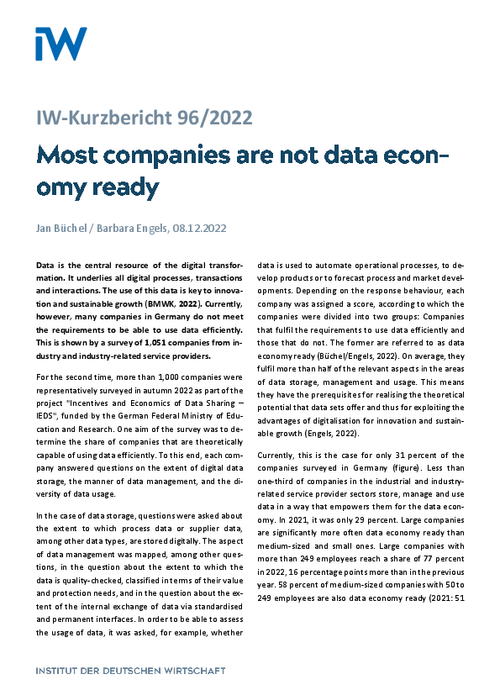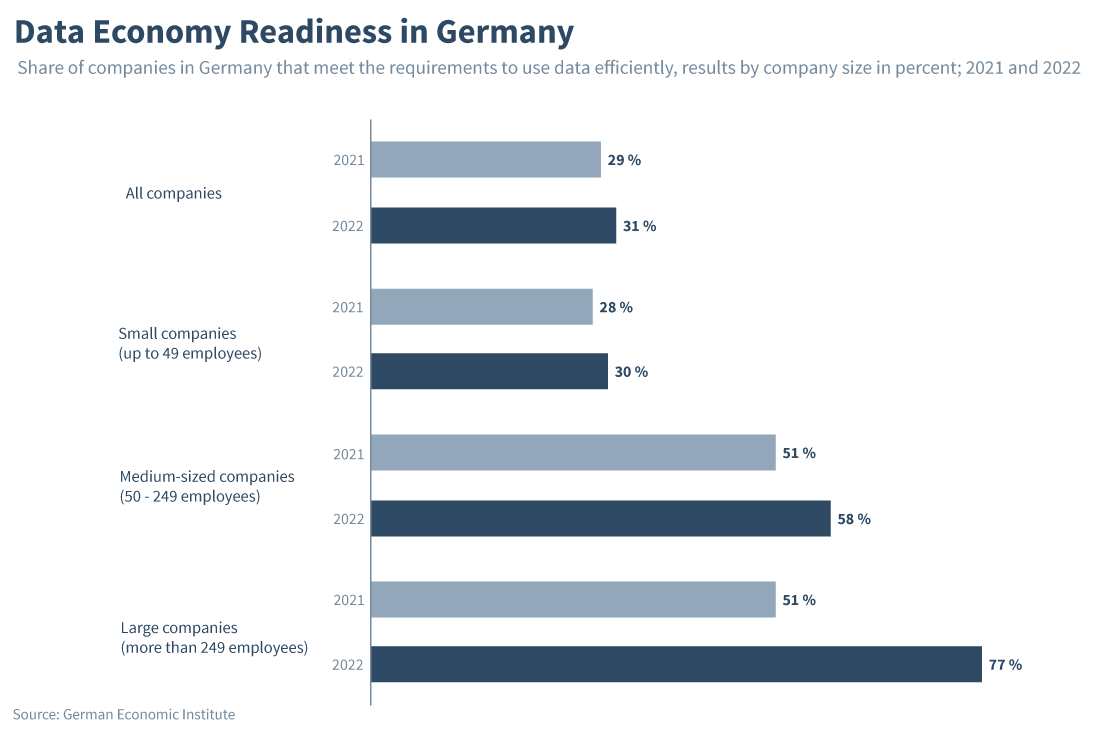Data is the central resource of the digital transformation. It underlies all digital processes, transactions and interactions. The use of this data is key to innovation and sustainable growth (BMWK, 2022). Currently, however, many companies in Germany do not meet the requirements to be able to use data efficiently. This is shown by a survey of 1,051 companies from industry and industry-related service providers.

Most companies are not data economy ready

Data is the central resource of the digital transformation. It underlies all digital processes, transactions and interactions. The use of this data is key to innovation and sustainable growth (BMWK, 2022). Currently, however, many companies in Germany do not meet the requirements to be able to use data efficiently. This is shown by a survey of 1,051 companies from industry and industry-related service providers.
For the second time, more than 1,000 companies were representatively surveyed in autumn 2022 as part of the project "Incentives and Economics of Data Sharing – IEDS", funded by the German Federal Ministry of Education and Research. One aim of the survey was to determine the share of companies that are theoretically capable of using data efficiently. To this end, each company answered questions on the extent of digital data storage, the manner of data management, and the diversity of data usage.
In the case of data storage, questions were asked about the extent to which process data or supplier data, among other data types, are stored digitally. The aspect of data management was mapped, among other questions, in the question about the extent to which the data is quality-checked, classified in terms of their value and protection needs, and in the question about the extent of the internal exchange of data via standardised and permanent interfaces. In order to be able to assess the usage of data, it was asked, for example, whether data is used to automate operational processes, to develop products or to forecast process and market developments. Depending on the response behaviour, each company was assigned a score, according to which the companies were divided into two groups: Companies that fulfil the requirements to use data efficiently and those that do not. The former are referred to as data economy ready (Büchel/Engels, 2022). On average, they fulfil more than half of the relevant aspects in the areas of data storage, management and usage. This means they have the prerequisites for realising the theoretical potential that data sets offer and thus for exploiting the advantages of digitalisation for innovation and sustainable growth (Engels, 2022).

Currently, this is the case for only 31 percent of the companies surveyed in Germany (figure). Less than one-third of companies in the industrial and industry-related service provider sectors store, manage and use data in a way that empowers them for the data economy. In 2021, it was only 29 percent. Large companies are significantly more often data economy ready than medium-sized and small ones. Large companies with more than 249 employees reach a share of 77 percent in 2022, 16 percentage points more than in the previous year. 58 percent of medium-sized companies with 50 to 249 employees are also data economy ready (2021: 51 percent). Among small companies with up to 49 employees, which are by far the most common in the German economy, the share is only 30 percent (2021: 28 percent).
In order to promote the data economy and thus data-based innovations, which offer numerous opportunities for economy and society, a successful data policy must therefore focus on small businesses in particular.
In addition to the European Commission's data strategy, the German government's data strategy must play a central role. It can provide a framework for the German government's 240 measures regarding data provision, data access, data use and data competences (BMWK, 2022). The announced triad of improving data provision, promoting data-driven business models and innovation-friendly regulation must provide incentives especially for small companies to manage their data more efficiently and thus leverage the potential of their data.

Most companies are not data economy ready

More on the topic
Intellectual property and fourth industrial revolution technologies: how the patent system is shaping the future in the data-driven economy
Using the classification system from the European Patent Office (EPO), we identify almost 600,000 patent applications for fourth industrial revolution technologies from 1986 to 2015.
IW
Artificial Intelligence – Will Boosted Productivity Lead to Better Pay?
Artificial intelligence (AI) is already being used in a wide variety of applications both inside and outside the corporate world.
IW